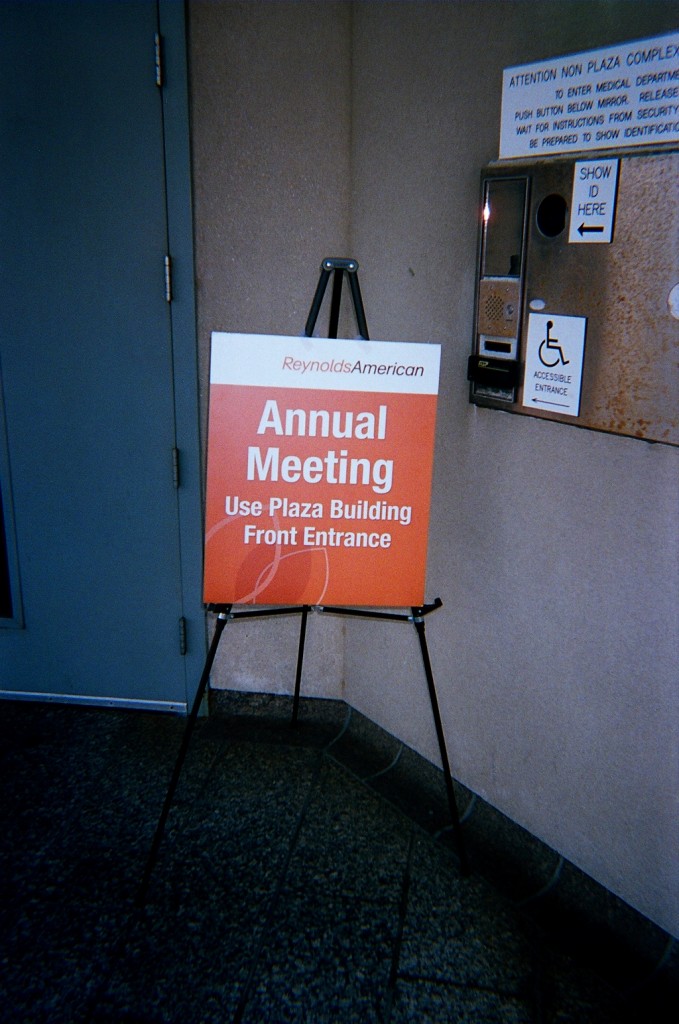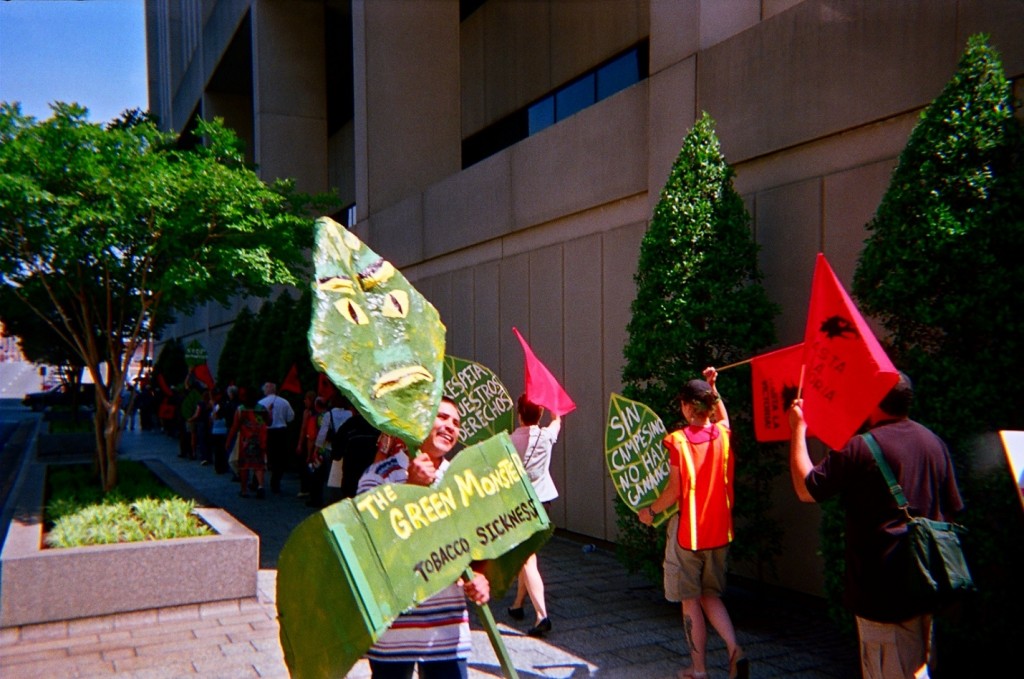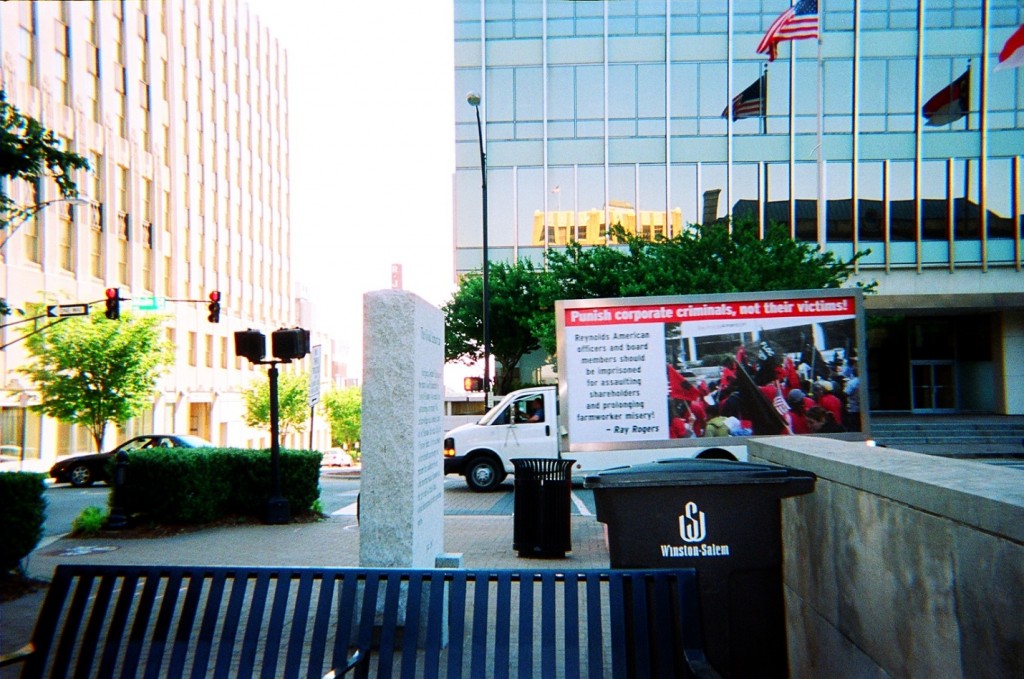By Edward L. Sweda, Jr., Senior Attorney – PHAI
NEW RULES REGARDING ADMITTANCE TO THE MEETING.
The Reynolds American Inc. (RAI) Annual Shareholders Meeting took place in Winston-Salem, North Carolina on Friday morning, May 7, 2010. According to a March 22, 2010 “Dear Shareholder” letter from President and CEO Susan M. Ivey, those shareholders who planned to attend the meeting “MUST pre-register for the meeting and request an admittance ticket no later than Wednesday, April 28, 2010.”

However, that letter, which was part of the company’s proxy materials, was not mailed to shareholders unless the shareholder specifically requested that the material be sent. Unfortunately, both I and shareholder Anne Morrow Donley of Virginia GASP missed the deadline for requesting an admission ticket by one day. Strictly adhering to the terms of this new rule, RAI’s Assistant Secretary, Dean E. Tsipis, informed me that the company was “unable” to fulfill my April 29, 2010 request for an admission ticket. “Unwilling” would have been a more accurate adjective.
Similarly, a new attendance rule by RAI kept out Keith T. Barber, a reporter for the Greensboro, North Carolina-based “Yes Weekly.” On April 28, 2010, RAI “announced” – via a release via PR Newswire but not by directly contacting local reporters – that members of the media had to request an admittance ticket by April 30, 2010. Mr. Barber, who arrived at the meeting on May 7, 2010, was barred from the meeting.
SECURITY
Winston-Salem’s taxpayers financially supported the heavy presence by the Winston-Salem Police Department (WSPD) at the Reynolds American meeting. Shortly after the 9:00 A.M. start of the meeting, there were four police officers standing in front of the building while four marked police cruisers were parked near the building’s main entrance. At the side of the building were another two parked police cruisers. As the FLOC demonstration was winding down at about 11:25 A.M., one of the WSPD officers told organizers of the demonstration that Reynolds management would like the demonstrators to leave the front of the building by 11:30 A.M.

FLOC

The major controversy at the RAI meeting was management’s unwillingness to meet with members of FLOC (Farm Labor Organizing Committee), AFL-CIO. (See this for details of FLOC’s campaign regarding Reynolds American. FLOC has also described desperate conditions in North Carolina’s tobacco fields, noting that nine workers have recently died in the fields, most due to heat stroke.
According to the Winston-Salem Journal, FLOC believes that “it has to be more vocal and demanding to persuade Reynolds to use its clout to pressure its suppliers to improve conditions for the state’s 30,000 tobacco farmworkers.” The company insists that its supplier list is proprietary and has refused to reveal who they are. Baldemar Velasquez, president of the Ministers
Conference of Winston-Salem and Vicinity, said that “We believe it is Reynolds’ role, and under its sphere of influence, to require its suppliers to treat the farm workers with dignity and proper work and living conditions.”
SHAREHOLDER RESOLUTIONS
Two of the shareholder resolutions considered at the meeting addressed issue of smoking and health and the company’s conduct. The first resolution was filed by proponents who noted that in 2009 RAI had challenged some provisions of the new law which allows the Food and Drug Administration (FDA) to regulate tobacco products, arguing that the law violated the company’s First Amendment rights. RAI also contended that FDA restrictions had limited the company’s ability to “convey ‘truthful information’ about its tobacco products.”


Therefore, “shareholders request the RAI Board of Directors to oversee the inclusion in all RAI product advertising, promotion and marketing (including inserts in tobacco packages themselves) truthful information regarding the devastating health consequences identified with using such products.” The proponents suggested that this truthful information cover the health hazards to smokers from smoking and to nonsmokers from breathing secondhand smoke; the decline in tobacco-related diseases when increased taxes on tobacco are combined with smoking restrictions; and the “human rights violations connected with undocumented workers in the U.S.A. and forced child labor in key ‘developing’ countries who pick tobacco leaf used by RAI.”
Not surprisingly, RAI management opposed the resolution calling on it to provide its customers with truthful information. It claimed that “Our Guiding principles and Beliefs” are sufficient.
The resolution received less than 2 percent of the shares voted and, thus, will not be eligible to be refiled for next year’s Shareholders Meeting.
The next resolution, on Human Rights Protocols for the Company and Its Suppliers, received over 10 percent of the shares voted and will be eligible for refilling for the 2011 meeting. The resolution requests that RAI’s Board of Directors “to commit itself to create effective procedures to implement the internationally agreed-upon human rights conventions in the countries from which it gets its tobacco and to find ways to ensure, through truly independent monitoring, that its varied suppliers are enforcing these as well as pertinent laws of the nations in which its suppliers operate.” The proponents specifically cited the African nation of Malawi, where “countless children are being forced into slave-like situations to provide leaf for RAI products,” and that “forced child labor persists to the degree that the U.S. Department of Labor lists Malawi’s tobacco production as particularly egregious.”
RAI management opposed this resolution as well, claiming that respecting universally recognized human rights “is one of the foundations of how we conduct our businesses.” Nonetheless, RAI opposed the resolution, stating that “we do not believe it is within our sphere of influence to assume the regulatory and enforcement role of the federal, state and local governments” in the United States.
Of course, the resolution had not called on the company to assume those roles; rather, the “truly independent monitoring” would be key to ensuring that the suppliers were adhering to these laws in countries such as Malawi. The proponents noted that “RAI cannot dismiss the above problems by saying its suppliers ‘report’ they comply with codes covering farm workers’ basic rights and that no forced child labor takes place in tobacco fields supplying RAI product.” If RAI feels it cannot enforce these basic codes, it could stop doing business with suppliers that abuse workers’ human rights. It has never done so.
